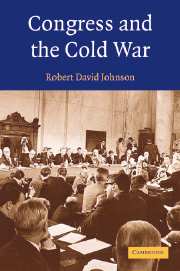Book contents
- Frontmatter
- Contents
- Abbreviations Used in the Text
- Acknowledgments
- Prologue
- Archives Consulted
- Congress and the Cold War
- 1 Constructing a Bipartisan Foreign Policy
- 2 Legislative Power and the Congressional Right
- 3 Redefining Congressional Power
- 4 The Consequences of Vietnam
- 5 The Transformation of Stuart Symington
- 6 The New Internationalists' Congress
- 7 The Triumph of the Armed Services Committee
- Appendix A The Foreign Aid Revolt of 1963
- Appendix B The Senate and U.S. Involvement in Southeast Asia, 1970–1974
- Appendix C The Senate of the New Internationalists, 1973–1976
- Appendix D The House and the End of the Cold War, 1980–1985
- Index
6 - The New Internationalists' Congress
Published online by Cambridge University Press: 05 June 2012
- Frontmatter
- Contents
- Abbreviations Used in the Text
- Acknowledgments
- Prologue
- Archives Consulted
- Congress and the Cold War
- 1 Constructing a Bipartisan Foreign Policy
- 2 Legislative Power and the Congressional Right
- 3 Redefining Congressional Power
- 4 The Consequences of Vietnam
- 5 The Transformation of Stuart Symington
- 6 The New Internationalists' Congress
- 7 The Triumph of the Armed Services Committee
- Appendix A The Foreign Aid Revolt of 1963
- Appendix B The Senate and U.S. Involvement in Southeast Asia, 1970–1974
- Appendix C The Senate of the New Internationalists, 1973–1976
- Appendix D The House and the End of the Cold War, 1980–1985
- Index
Summary
According to John Sherman Cooper, events in Southeast Asia prompted most members of Congress to reconsider “the scope of the respective congressional powers and the President's powers” in war-making. Undoing 25 years of precedent through legislation, however, proved difficult. J. William Fulbright and Mike Mansfield initially championed a non-binding national commitments resolution urging the president to avoid entering foreign entanglements unilaterally. In the House, the second-ranking Democrat on the Foreign Affairs Committee, Clement Zablocki (D-Wisconsin), proposed a resolution asking the president to consult Congress whenever feasible before sending U.S. troops into combat.
Though Zablocki called his offering a “war powers” bill, the more sustained thought on this question occurred in the Senate. Debate centered on a measure sponsored by Jacob Javits holding that absent a declaration of war, the president could commit armed forces only to repel an armed attack, imminent threat of such an attack, or an attack on U.S. armed forces outside of the United States; protect and evacuate U.S. citizens; or pursuant to specific statutory authorization by Congress. When such an action occurred, the bill required the president to report the matter to Congress, after which the operation could continue only for 30 days without a congressional authorization. (In a concession to political realities, Javits exempted current hostilities from the bill's provisions.) Never one to downplay his significance, the New York senator described the measure as “one of the most important pieces of legislation in the national security field” in the twentieth century.
- Type
- Chapter
- Information
- Congress and the Cold War , pp. 190 - 241Publisher: Cambridge University PressPrint publication year: 2005



